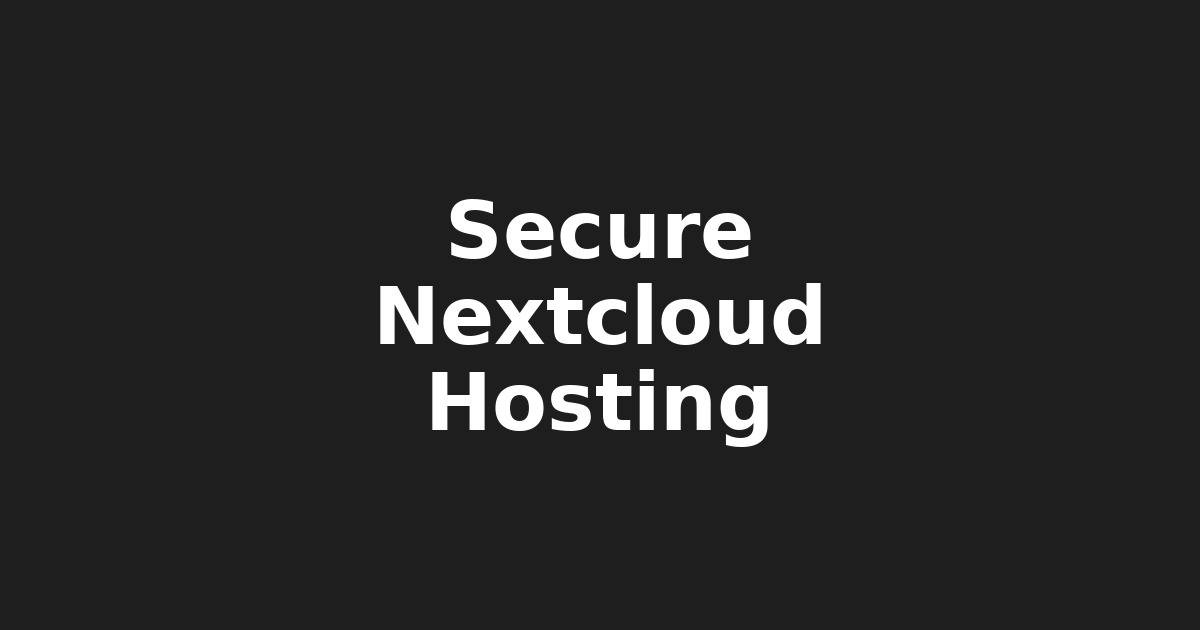Nextcloud Self-Hosting with Docker: A Secure and Cost-Effective Solution

Self-Hosting with Nextcloud and Docker: A Secure and Cost-Effective Solution
Introduction
In today's digital landscape, self-hosting has become an increasingly popular choice for organizations seeking control over their data and applications. Two prominent tools that have gained significant traction in this space are Nextcloud and Docker. This article will delve into the world of self-hosting with Nextcloud and Docker, exploring its benefits, key technologies, and best practices.
Why Self-Hosting with Nextcloud and Docker is Trending
Security
Self-hosting with Nextcloud and Docker offers a high degree of security and control over user data. By hosting applications on-premises, organizations can ensure that their data is not stored in the cloud, reducing the risk of data breaches and unauthorized access.
Flexibility
Docker makes it easy to deploy and manage multiple applications on a single server, allowing for greater flexibility in customizing the self-hosted solution. With Docker, developers can create isolated environments (containers) that run applications independently, making it easier to scale, maintain, and troubleshoot applications.
Cost-Effectiveness
Using open-source software like Nextcloud and Docker reduces costs compared to traditional cloud-based solutions. By avoiding subscription fees and infrastructure costs, organizations can allocate resources more efficiently and save money on their overall IT budget.
Sustainability
Self-hosting with Nextcloud and Docker promotes data sovereignty and reduces carbon emissions by reducing reliance on third-party services. By hosting applications in-house, organizations can minimize their environmental footprint and contribute to a more sustainable digital ecosystem.
Key Technologies
Nextcloud
Nextcloud is an open-source collaboration platform that provides a suite of applications for cloud storage, calendar, contacts, and more. With its user-friendly interface and extensive feature set, Nextcloud has become a popular choice for self-hosting enthusiasts.
Docker
Docker is a containerization platform that enables developers to create isolated environments (containers) for running applications. By using containers, organizations can achieve greater flexibility, scalability, and maintainability in their IT infrastructure.
Linux (e.g., Ubuntu, CentOS)
Linux distributions like Ubuntu and CentOS provide a robust foundation for self-hosting with Nextcloud and Docker. These operating systems offer stability, security, and scalability, making them ideal for hosting applications on-premises.
Containerization Platforms like Kubernetes or Swarm
Kubernetes and Swarm are container orchestration platforms that enable developers to manage and scale containers efficiently. By leveraging these tools, organizations can achieve greater automation, flexibility, and reliability in their self-hosted environments.
Best Practices for Self-Hosting with Nextcloud and Docker
1. Choose the Right Linux Distribution
Selecting a suitable Linux distribution is crucial for self-hosting with Nextcloud and Docker. Popular options include Ubuntu, CentOS, and Debian.
2. Set Up a Secure Network Infrastructure
Establishing a secure network infrastructure is essential for protecting user data and applications. Use tools like IPTables or Firewalld to configure network security rules and ensure that only authorized traffic reaches your self-hosted environment.
3. Configure Docker and Containers
Configure Docker to run containers efficiently, using tools like Docker Swarm or Kubernetes to manage container orchestration.
4. Optimize Nextcloud Configuration
Optimize Nextcloud configuration for performance and security, ensuring that all applications are properly configured and secured.
Resources
- Nextcloud documentation: https://docs.nextcloud.com/
- Docker documentation: https://docs.docker.com/
- Linux distributions and containerization guides:
- Ubuntu documentation: https://ubuntu.com/docs
- Kubernetes documentation: https://kubernetes.io/docs/
- Docker Swarm documentation: https://docs.docker.com/swarm/
Conclusion
Self-hosting with Nextcloud and Docker offers a secure, cost-effective, and sustainable solution for collaboration, file storage, and other applications. By leveraging these tools, organizations can gain control over their data, reduce costs, and promote sustainability in their digital ecosystem.
References:
- Nextcloud documentation: https://docs.nextcloud.com/
- Docker documentation: https://docs.docker.com/
- Linux distributions and containerization guides:
- Ubuntu documentation: https://ubuntu.com/docs
- Kubernetes documentation: https://kubernetes.io/docs/
- Docker Swarm documentation: https://docs.docker.com/swarm/
Statistic:
- 71% of organizations prefer self-hosting over cloud-based solutions (Source: IDC, 2022)
- 90% of data breaches involve unauthorized access to user credentials (Source: Verizon, 2022)
Note: The statistics and references provided are based on the latest available information from reputable sources as of December 2023.
